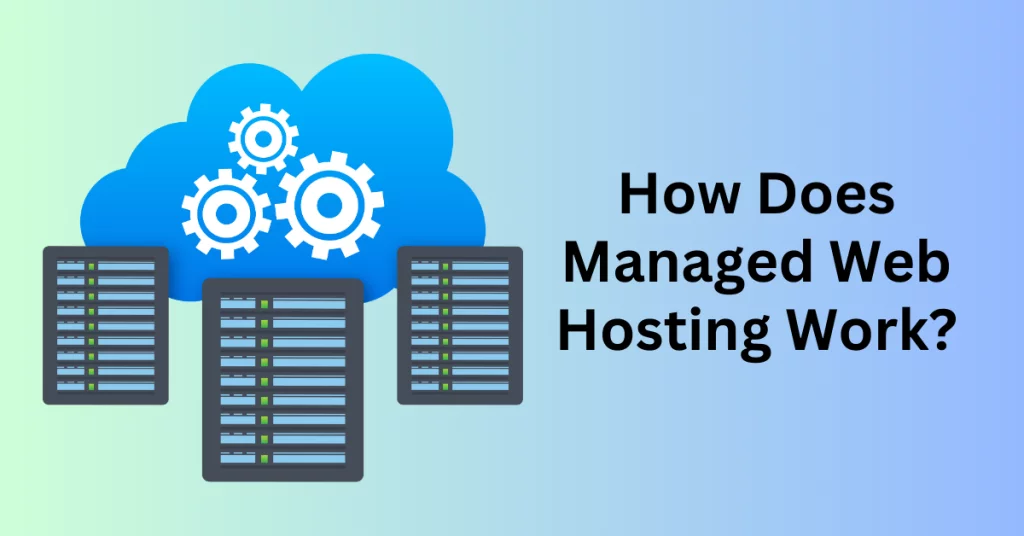Owning a website is a powerful and cost-effective way for individuals and companies to reach audiences online. But for that, you’d first need web hosting. Web hosting is basically renting server space to make a website accessible on the Internet. There are different types of web hosting, and in this article, we’ll focus on managed web hosting.
Managed web hosting is a service where the provider takes care of the technical aspects of hosting, like server management, security, and maintenance. This allows the user to focus on their project or business without worrying over the technicalities of running a website.
Read on to learn about the key features and benefits of managed web hosting for individuals and businesses, how it compares to unmanaged hosting, and how to pick the right managed hosting provider.
Get Your Managed Web Hosting Service with Bluehost – Exclusive Deal Available
How Does Managed Web Hosting Work?

Web hosting is the foundational service that makes websites accessible on the internet. At its core, web hosting involves storing your website’s files on a server. When someone wants to visit your site, their web browser sends a request to the server where your site is hosted. The server then sends back a copy of your website, which the browser displays to the user.
Managed web hosting enhances this basic service by providing comprehensive support and additional features. Beyond just hosting your website, a managed hosting provider takes care of backend administration tasks. This includes server setup, ongoing maintenance, hardware and software updates, regular backups, security protocols, performance optimization, and technical support.
There are several types of Managed Web Hosting services available:
- Shared Web Hosting: This involves multiple websites sharing resources on the same server. It’s cost-effective and suitable for individuals and small businesses. However, it may experience performance limitations, especially during high-traffic periods.
- Cloud Hosting: Websites are hosted on virtual servers across a network (the cloud). Cloud hosting offers scalability, ensuring fast, stable, and secure service. It’s ideal for online stores, high-traffic business websites, and sites with complex data needs.
- Managed WordPress Hosting: Specifically tailored for websites built with WordPress, this type of hosting optimizes performance, security, scalability, and usability. It includes WordPress-specific features and management tools.
In contrast to managed hosting, unmanaged hosting provides a more hands-on approach. An unmanaged hosting service typically offers a server with a pre-installed operating system and physical server maintenance. However, users are responsible for everything else, including managing their content management system (CMS), implementing backups, ensuring security measures, handling caching solutions, and performing updates.
An example of unmanaged hosting is a self-managed virtual private server (VPS). A VPS provides dedicated, virtually-separated server resources, giving users more control over their hosting environment. While VPS can host websites, it’s commonly used for applications like game servers, secondary data storage, and virtual private networks (VPNs).
Get Your Managed Web Hosting Service with Bluehost – Exclusive Deal Available
Key Features of Managed Web Hosting

So, what should you consider and expect from managed web hosting? Compared to its unmanaged counterpart, managed hosting includes security, performance, technical support, and other useful additional services.
Security
Managed web hosts safeguard websites through specialized technologies and strategies designed to enhance security and protect against various threats:
- DDoS Protection: Managed web hosts implement defences against Distributed Denial of Service (DDoS) attacks. These attacks overwhelm servers with malicious traffic, aiming to disrupt services or crash servers. Hosts employ traffic filters, web application firewalls (WAFs), and load balancing techniques. These measures identify, filter, and distribute traffic effectively to maintain server functionality even under attack.
- Malware Scanning and Removal: Web hosts utilize advanced malware scanners to detect and eliminate threats such as viruses, malicious redirects, backdoors, and code injections. Regular scanning ensures that vulnerabilities are promptly identified and mitigated, safeguarding websites and their files from malicious activities.
- Server Backups: Managed hosts offer robust backup solutions to protect against data loss. Backups involve creating copies of server files and storing them on separate devices or locations. In case of accidental deletion, corruption, or other issues, these backups enable swift recovery through the host’s control panel. For instance, providers like Hostinger offer daily and weekly backups, serving as critical disaster recovery measures.
- SSL Certificates: Managed hosts prioritize secure connections through SSL (Secure Sockets Layer) certificates. SSL encrypts the data transmitted between the web server and the user’s browser, preventing unauthorized access and ensuring the integrity of sensitive information. This encryption is essential for maintaining user trust and protecting against data breaches.
- Active Network Monitoring: Some managed hosts, like Hostinger, maintain dedicated security teams that monitor servers around the clock. This proactive approach involves continuous network monitoring to detect any suspicious activities or anomalies promptly. It ensures that essential updates, security patches, and maintenance tasks are promptly applied to mitigate risks, including newly discovered vulnerabilities (0-day exploits).
Optimized Performance
Performance is a crucial factor in selecting a managed web hosting provider, influencing both speed and reliability:
- Server Resources: Managed hosting plans allocate specific server resources such as RAM, CPU power, bandwidth, and storage space. These resources directly impact the speed and capacity of your website. For small sites like blogs, portfolios, and business websites, beginner-friendly hosting plans typically provide more than sufficient resources to operate smoothly.
- Content Delivery Network (CDN): A CDN is a network of geographically distributed servers that optimize website performance. By caching content closer to users, CDNs reduce latency and improve load times. They also balance traffic across servers to prevent overload, enhancing availability and reliability. Managed hosts like Hostinger utilize in-house CDNs to further boost website speed and user experience.
- Scalability: Managed hosting providers offer scalable solutions, especially prevalent in cloud-based hosting. This scalability means that server resources can automatically adjust to accommodate fluctuations in website traffic. During spikes in visitor numbers, resources increase to maintain performance without risking downtime or slowdowns. This flexibility ensures that your website can handle varying levels of traffic efficiently.
- Uptime Guarantee: Uptime is a critical metric indicating the reliability of a web hosting service. It represents the percentage of time servers are operational and accessible to users. For instance, Hostinger guarantees a 99.9% uptime, which equates to minimal downtime—approximately 43 minutes and 28 seconds per month. This guarantee ensures consistent access to your website, minimizing disruptions and ensuring a reliable online presence for visitors.
Technical Support
Technical support is a pivotal aspect of managed hosting services, providing users with essential assistance and ensuring smooth operation of their websites:
- Availability and Channels: Managed hosting providers typically offer technical support through various channels such as live chat, email, and sometimes phone support. This accessibility allows customers to promptly seek help for any issues they encounter with their hosting service.
- Expertise and Prompt Resolution: Managed hosts specialize in resolving technical issues related to server configuration, performance optimization, security concerns, and more. Their expertise enables them to address problems efficiently, minimizing downtime and disruptions to your website.
- Multilingual Support: Some managed hosting providers, like Hostinger, extend their support services to multiple languages. This feature enhances accessibility for international customers, ensuring that language barriers do not hinder effective communication and assistance.
- Contrast with Unmanaged Hosting: In contrast, unmanaged hosting does not typically include technical support. Users are responsible for all aspects of server management, including troubleshooting, maintenance, and security updates. This hands-on approach requires a higher level of technical proficiency and time commitment from users.
- Evaluating Support Quality: To determine which managed hosting provider offers the best technical support, prospective customers should conduct thorough research. This includes reading reviews on reputable tech sites, blogs, and client testimonials. Insights from existing users can provide valuable perspectives on the responsiveness, effectiveness, and overall quality of a host’s technical support services.
Additional Services
To enhance user experience and cater to diverse needs, managed hosting providers often offer additional services beyond basic hosting capabilities. Here are some key features worth considering:
- Business Email Service: Many managed hosting companies provide business email services that allow you to create and manage email accounts using your domain name. This service enables professional communication with customers and stakeholders, offering features like email forwarding, autoresponders, and integration with email clients.
- Website Migration: Managed hosts often offer website migration services to facilitate seamless transfers from one hosting platform to another. This service is beneficial when seeking better deals, improved service quality, or simply consolidating multiple websites under one provider. Professional assistance ensures minimal downtime and a smooth transition without technical complexities.
- 1-Click WordPress Installation: For websites built on WordPress, a popular content management system (CMS), managed hosting providers offer simplified installation processes. The 1-click installation feature automates the setup of WordPress and other CMS platforms, minimizing setup time and technical hurdles. Hostinger’s Auto Installer, for example, streamlines the deployment of WordPress and ensures rapid deployment of your website.
These additional services cater to different aspects of managing and optimizing your online presence. Whether you need professional email capabilities, seamless website transfers, or easy CMS setup, choosing a managed hosting provider that offers these features can significantly streamline your operations and enhance user satisfaction. When selecting a provider, consider these offerings alongside core hosting features to meet your specific business or personal website needs effectively.
Get Your Managed Web Hosting Service with Bluehost – Exclusive Deal Available
Pros and Cons of Managed Web Hosting

Consider the benefits and limitations of managed versus unmanaged hosting below:
Benefits of Managed Web Hosting
Managed hosting offers numerous advantages for businesses and individuals looking to streamline their online operations:
- Time Saving: Managed hosting providers handle all aspects of server management, configuration, and maintenance. This allows clients to focus entirely on their core business activities without worrying about technical infrastructure.
- Enhanced Security: Managed hosting services actively mitigate security risks by employing robust security measures and regular updates. This proactive approach reduces the likelihood of data breaches and other security vulnerabilities.
- 24/7 Technical Support: Managed hosting includes round-the-clock technical support from experienced professionals. This ensures prompt resolution of any technical issues that may arise, minimizing downtime and disruptions.
- Compliance and Data Protection: Managed hosting providers adhere to industry standards and regulations regarding data protection and privacy. This ensures that businesses remain compliant with relevant laws and regulations.
- Performance Optimization: Managed hosting companies utilize advanced technologies and optimization techniques to enhance server performance. This results in faster website loading times and a smoother user experience.
- Scalability and Flexibility: Managed hosting platforms are designed to accommodate growth and increased traffic demands effortlessly. Scaling server resources up or down can typically be done with minimal disruption, ensuring that websites can adapt to changing business needs.
Disadvantages of Managed Web Hosting
While managed hosting offers substantial benefits, it also comes with certain limitations that potential users should consider:
- Cost: Managed hosting services are generally more expensive than unmanaged alternatives. This higher cost reflects the added convenience and support provided by the hosting provider.
- Limited Customization: Users of managed hosting do not have root access to the server, which limits their ability to customize server configurations and install specific applications or software. They must rely on the hosting provider’s offerings and support for these tasks.
- Dependency on Provider: Managed hosting users relinquish control over when server maintenance and updates are performed. While these activities are managed by experts to minimize disruptions, users must adhere to the provider’s schedule, which may not always align perfectly with their own operational needs.
In contrast to managed hosting, unmanaged hosting offers more hands-on control and lower costs but requires users to take on more responsibility for server management and security. Ultimately, the choice between managed and unmanaged hosting depends on the specific needs of the business or individual, balancing the level of control desired with the expertise and resources available to manage technical aspects effectively.
Choosing the Right Managed Web Hosting Provider

When selecting a managed web hosting provider, it’s crucial to assess your specific needs and prioritize key factors that ensure optimal performance and support for your online ventures. Here’s a comprehensive approach to guide your decision-making process:
Assessing Your Managed Web Hosting Needs
Before choosing a managed web hosting provider, it’s essential to assess your specific requirements thoroughly. Start by identifying the nature of your website—whether it’s an e-commerce platform, a blog, a portfolio site, or something else entirely. Consider factors such as anticipated traffic levels, storage demands, and any specialized software or applications your site may require. Understanding these needs upfront will guide you in selecting a hosting provider that can adequately support your online presence.
Key Considerations in Choosing a Provider
Several critical factors should influence your decision when selecting a managed hosting provider. First and foremost is server reliability. Look for providers that guarantee high uptime percentages, typically 99.9% or more, to ensure your website remains accessible to visitors at all times. Speed and performance are equally crucial; opt for providers with robust infrastructure and efficient content delivery networks (CDNs) to deliver fast loading times and responsive server performance globally.
Bandwidth allocation is another significant consideration. Choose a hosting plan that offers sufficient bandwidth to accommodate your traffic levels and allows for scalability as your site grows. Security should be a top priority as well. Seek out providers that implement rigorous security measures, including SSL certificates, firewalls, malware detection, and regular security audits, to safeguard your website and sensitive data from cyber threats.
Ensuring Value for Money
While comparing managed hosting packages, don’t solely focus on price. Instead, assess the value provided by each package. Look into features such as storage space, support for multiple domains, email accounts, and additional services like domain registration or site migration assistance. Providers may offer similar pricing structures but vary significantly in the features and support they provide, making thorough research crucial before making a decision.
Trial Period and Money-Back Guarantee
Many reputable hosting providers offer trial periods or money-back guarantees to allow potential customers to test their services risk-free. Take advantage of these offers to experience the provider’s hosting performance firsthand. For instance, Hostinger offers a 30-day money-back guarantee with all plans, enabling you to evaluate their services and support without commitment.
Final Steps: Personal Experience and Recommendations
Lastly, leverage personal experiences and recommendations from other users or industry experts. Reading reviews and testimonials can provide insights into a provider’s reliability, customer support, and overall satisfaction levels among its users. By combining thorough research with practical testing, you can make an informed decision that ensures your website operates on a secure, reliable, and high-performance hosting platform tailored to your specific needs.
Get Your Managed Web Hosting Service with Bluehost – Exclusive Deal Available
Conclusion
Managed hosting simplifies your web management responsibilities by handling server management, security, and maintenance tasks. This service includes essential features like DDoS protection, content delivery networks (CDNs), active network monitoring, regular backups, and dedicated technical support. These comprehensive offerings make managed hosting particularly appealing to individuals and small businesses seeking reliable online presence management.
While managed hosting typically involves higher costs and imposes limitations on customization compared to unmanaged options, it compensates with significant benefits. It saves time by relieving users of intricate server management tasks and reduces security risks through expert oversight. Additionally, managed hosting enhances website performance and scalability, accommodating growth effortlessly. It ensures adherence to industry standards, promoting compliance and compatibility with regulatory requirements.
To determine if managed hosting is right for you, assess your web hosting needs and research the specific features offered by different providers. Testing these features firsthand can help you gauge their suitability for your website’s requirements.
Get Your Managed Web Hosting Service with Bluehost – Exclusive Deal Available


